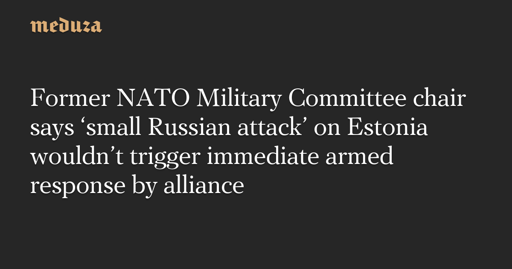The North Atlantic Treaty Organization’s collective defense principle wouldn’t necessarily trigger an immediate armed response in the event of a “small attack” by Russia against a member like Estonia, Admiral Rob Bauer, former Chair of the NATO Military Committee, told the newspaper Die Welt in a June 23 interview. Bauer explained that a small Russian operation that does not threaten a member’s “overall territorial integrity” would leave “time for consultations” to weigh the question: “Do we want to start a war or not?”
Bauer also argued that “Putin doesn’t see NATO as an immediate threat,” pointing to Russia’s muted response to Finland joining the alliance and the largely rhetorical nature of the Kremlin’s nuclear threats.
[…]



Not only that, some of the defensive plans during the Cold War were pretty destructive for the defended countries. One big part of the planned response to an all-out Warsaw Pact assault on Western Germany, for example, would have been to detonate several truckloads (in total 141) of nuclear mines on choke points along strategically advantageous routes in order to slow down the attack.
There were prepared shafts for deploying those mines on important choke points near the East German border along the most likely avenues of attack.